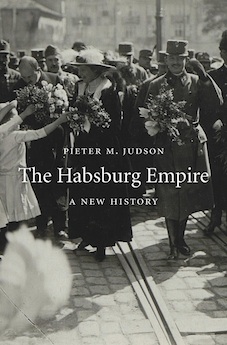By Benjamin Franklin Martin
The Habsburg Empire disintegrated at the end of World War I, leaving much of Central and Eastern Europe divided into “successor states”: Austria, Hungary, Poland, Czechoslovakia, Romania, and Yugoslavia. Their history during the 1920s and 1930s—factional, chaotic, and authoritarian—evoked sympathy for a regime that had, however haphazardly, maintained stability and a relative peace among the many ethnic groups now divided and quarreling.
Was the collapse of the Habsburg Empire inevitable? Traditional historiography has portrayed it as “a doomed anachronism.” In this long rebuttal, Pieter M. Judson (ΦBK, Swarthmore College, 1978) argues that the empire “crucially stabilized and coordinated heterogeneous desires, needs, and practices” and that it “celebrated the diversity of its peoples in its own terms, casting this diversity as a strength that benefitted all its citizens.” Indeed, the empire’s very laws were often retained by the successor states which were themselves mini-empires, all of them having a similar multiplicity of languages, customs, and religions.
For Judson, the foundations for the Habsburg Empire’s long success were laid by Maria Theresa and Joseph II during the eighteenth century as they imposed over their diverse lands the common administration of a Rechsstaat, “a state that functioned according to the rule of law and not a ruler’s whim,” or the whim of the locally powerful. Over the long reign of Francis Joseph in the nineteenth century, railroads, increasing literacy, near-universal military service for males, and the slow expansion of suffrage pulled these disparate lands closer together.
But too slowly: for the siren call of nationalism had taken hold in Europe and especially within the Habsburg Empire, where no ethnic group was a majority. Judson insists that nationalists among every group stirred up differences that might otherwise have remained inconsequential, and he rightly notes that the goal of the nationalists was much more often autonomy within the empire rather than independence from it.
However, Judson largely passes over the many foreign policy mistakes by the Habsburg Empire, from the armed neutrality of the Crimean War in 1854 to the declaration of war against Serbia in 1914, and their proof of failures by the dynasty and the government. Perhaps greater clarity about motive and execution might have come from a closer examination of the empire’s leading personalities. Certainly, Judson’s rehabilitation of the Habsburg Empire has merit, but he has a long historiography to refute. Perhaps the book’s greatest contribution is encouraging readers to take on the problems and issues Judson raises.
Benjamin Franklin Martin (ΦΒΚ, Davidson College, 1969) is the Price Professor of History at Louisiana State University and a resident member of the Beta of Louisiana Chapter of Phi Beta Kappa.




